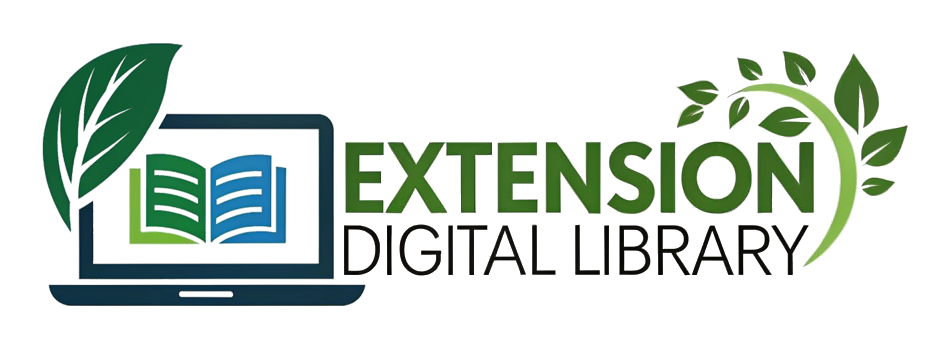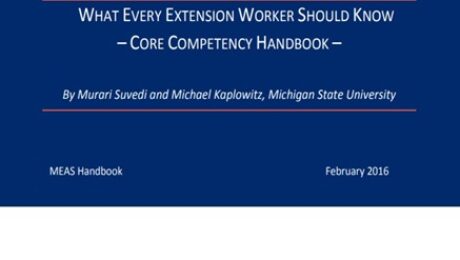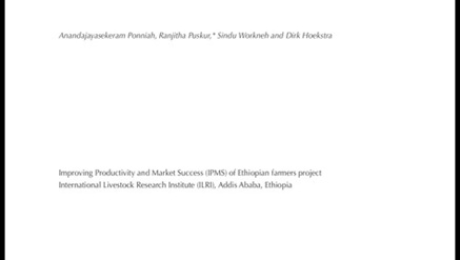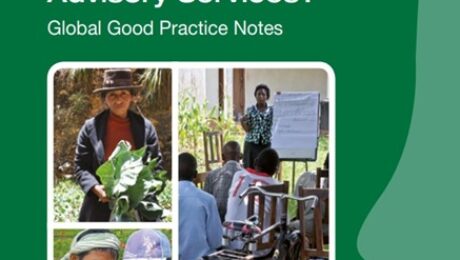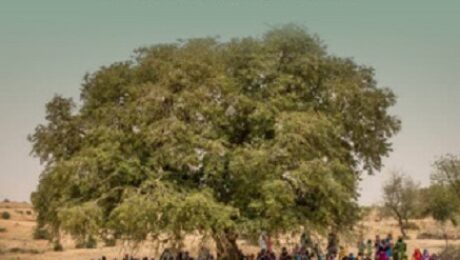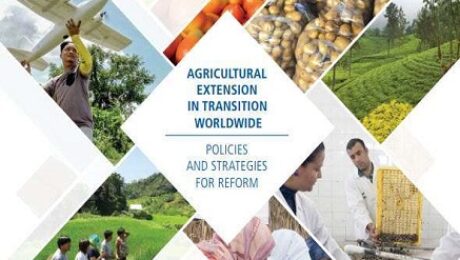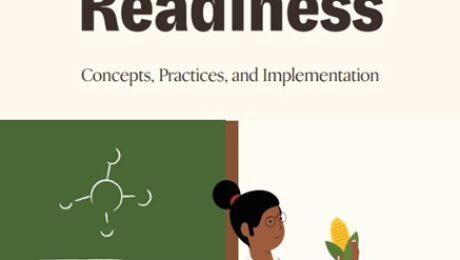A decision guide for rural advisory methods
This decision guide is intended to help extension professionals and their organizations make informed decisions about which extension method and approach to use for providing information, technologies and services to rural producers and to facilitate interactions and knowledge flow. Expected users include field-based rural advisors, extension managers and programme planners.
- Published in CONCEPTS AND PRACTICES, GUIDE/TOOLS/MANUALS
What Every Extension Worker Should Know – Core Competency Handbook
This core competency handbook is timely in the current context as it could elucidate multiple roles of extension in agriculture and rural development. Demands of several stakeholders on extension are increasing and so is the demand for enhanced capacities of extension professionals. Suvedi and Kaplowitz, the authors of this handbook, have identified core skills necessary for agriculture extension field level professionals to improve their capacity to address the emerging problems of the farming communities.
The book has nine chapters. The first chapter contains a brief history of extension services. The narration includes the evolution in extension approaches from the TOT of yesteryears to the present day demand-driven participatory and pluralistic extension. There must be a change in the mindset of the extension professionals to focus not only on technology transfer but also to deal with several challenges the farmers are encountering in their endeavour to increase the agricultural production and income from farming.
- Published in CONCEPTS AND PRACTICES
Concepts and practices in agricultural extension in developing countries: A source book
The first chapter outlines the emerging challenges faced by agricultural R&D sectors and how paradigms are evolving in response to these changes and challenges. The second chapter traces the evolution of agricultural extension thinking and practice. It highlights some generic problems faced at various stages of evolution and approaches to address them. It highlights the factors identified in literature as contributing to successful knowledge dissemination processes and creating higher access to clients to the services. While reflecting on the challenges and opportunities, the chapter also explores the possible future of extension services in developing countries. The third chapter gives an account of the various extension models, approaches and methods that have been tried out in developing countries and the experiences. The chapter concludes with the transition being made to agricultural innovation systems from Research & Extension systems and highlights the role of extension services in this context. Chapter four highlights the importance of farmer groups in providing effective extension services and promoting innovation. It explains in detail the processes, approaches and methods involved in group formation and development, management, performance assessment and, monitoring and evaluation. Chapter five lists and describes in detail the various tools and methods used in participatory research and development processes. Chapter six focuses on the very important issues of Monitoring and Evaluation as systems for learning and for facilitating reflective action cycles. The importance of participatory approaches in M&E, process monitoring and outcome mapping are highlighted. This book can be used by students and practitioners of extension, researchers and decision-makers. This is a collation of knowledge regarding the practice of extension and is not intended to be used as a recipe or blue print. Based on the context and the requirement, the approaches and tools should be selected, adapted and used. There is a built-in flexibility that would allow the user to employ his/her experience, creativity and imagination in adapting and using the approaches and tools described in this source book.
- Published in CONCEPTS AND PRACTICES
What Works in Rural Advisory Services ? Global Good Practice Notes
GFRAS used these definitions and combined them with the concept of ‘best fit’ to define good practices used in RAS as techniques or approaches that fit local sociocultural, ecological, economic, and political conditions and that embrace pluralism (that is, the provision of advisory services by different types of organisations); increase accountability to rural clients; are inclusive (engage marginalised groups such as women, youth, and the poor); develop human resource capacity; and are sustainable. Good practices allow RAS programmes to be more effective and efficient, and to meet programme goals. The techniques or approaches may concern advisory methods, structures, or governance.
- Published in CONCEPTS AND PRACTICES
Handbook: Rural extension, Volume 1: Basic issues and concepts
This is the first book in a three-volume series on rural extension (see 1553) aimed at promoting greater transparency in extension planning, implementation and evaluation. It discusses the role of extension in rural development, extension approaches, concepts and methods, and the use of extension aids and media. The book includes case-studies illustrating approaches and methods, and concludes with practical guidelines and checklists.
- Published in CONCEPTS AND PRACTICES
Agricultural extension: Global status and performance in selected countries
Agricultural transformation and development are critical to the livelihoods of more than a billion small-scale farmers and other rural people in developing countries. Extension and advisory services play an important role in such transformation and can assist farmers with advice and information, brokering and facilitating innovations and relationships, and dealing with risks and disasters. Agricultural Extension: Global Status and Performance in Selected Countries provides a global overview of agricultural extension and advisory services, assesses and compares extension systems at the national and regional levels, examines the performance of extension approaches in a selected set of country cases, and shares lessons and policy insights. Drawing on both primary and secondary data, the book contributes to the literature on extension by applying a common and comprehensive framework — the “best-fit” approach — to assessments of extension systems, which allows for comparison across cases and geographies. Insights from the research support reforms — in governance, capacity, management, and advisory methods — to improve outcomes, enhance financial sustainability, and achieve greater scale. Agricultural Extension should be a valuable resource for policymakers, extension practitioners, and others concerned with agricultural development.
- Published in CONCEPTS AND PRACTICES
Agricultural Extension in Transition Worldwide: Policies and Strategies for Reform
Agricultural Extension in Transition Worldwide: Policies and Strategies for Reform
Food and Agriculture Organization of the United Nations Rome, (2020)
Prepared by Magdalena Blum, Francesca Cofini and Rasheed Sulaiman V
The purposes of the modules are to review the major reforms being considered internationally – reforms that aim to change the policy and institutional structure and operations of public sector agricultural extension systems, and thus enhance a transition to better coordinated pluralistic, demand-led advisory systems. The advantages and disadvantages of each aspect of these reforms are examined and illustrated by the selected case studies. The modules provide a foundation for extension reform affecting the entire set-up and mode of operation of agricultural extension. This review of reforms is intended to provide insights for senior-level officials and others interested in the development of agricultural advisory systems. The modules review trends, concepts and experiences, and, as such, are not intended to be prescriptive, or to adhere necessarily to any one point of view, but instead to provide a basis for informed decision-making by government policy-makers and senior management of extension and advisory services, as well as agricultural advisors.
- Published in CONCEPTS AND PRACTICES, EXTENSION AND INNOVATION, POLICY
Scaling Readiness- Concepts, Practices, and Implementation
Scaling Readiness supports organizations, projects, and programs in achieving their ambitions to scale innovations. Scaling Readiness encourages critical reflection on how ready innovations are for scaling and what appropriate actions could accelerate or enhance scaling. Scaling Readiness treats innovation as a flexible package of technological, organizational, and institutional components that may include crop varieties, machines or equipment, crop production practices, legislation, and marketing campaigns.
An innovation may be ready in a technical sense – for example, a new crop variety may thrive in the local environment – but, if farmers lack funds to buy seed or if the policy environment discourages the uptake of new varieties, it may not be adopted at scale. Scaling Readiness assesses the potential of innovations to be used at scale and guides research and development intervention managers in implementing these innovations in practical contexts. Through its standardized data collection and analysis approach, Scaling Readiness can also be used to monitor an intervention portfolio at organizational level, allowing for evidence based management.
- Published in CONCEPTS AND PRACTICES
